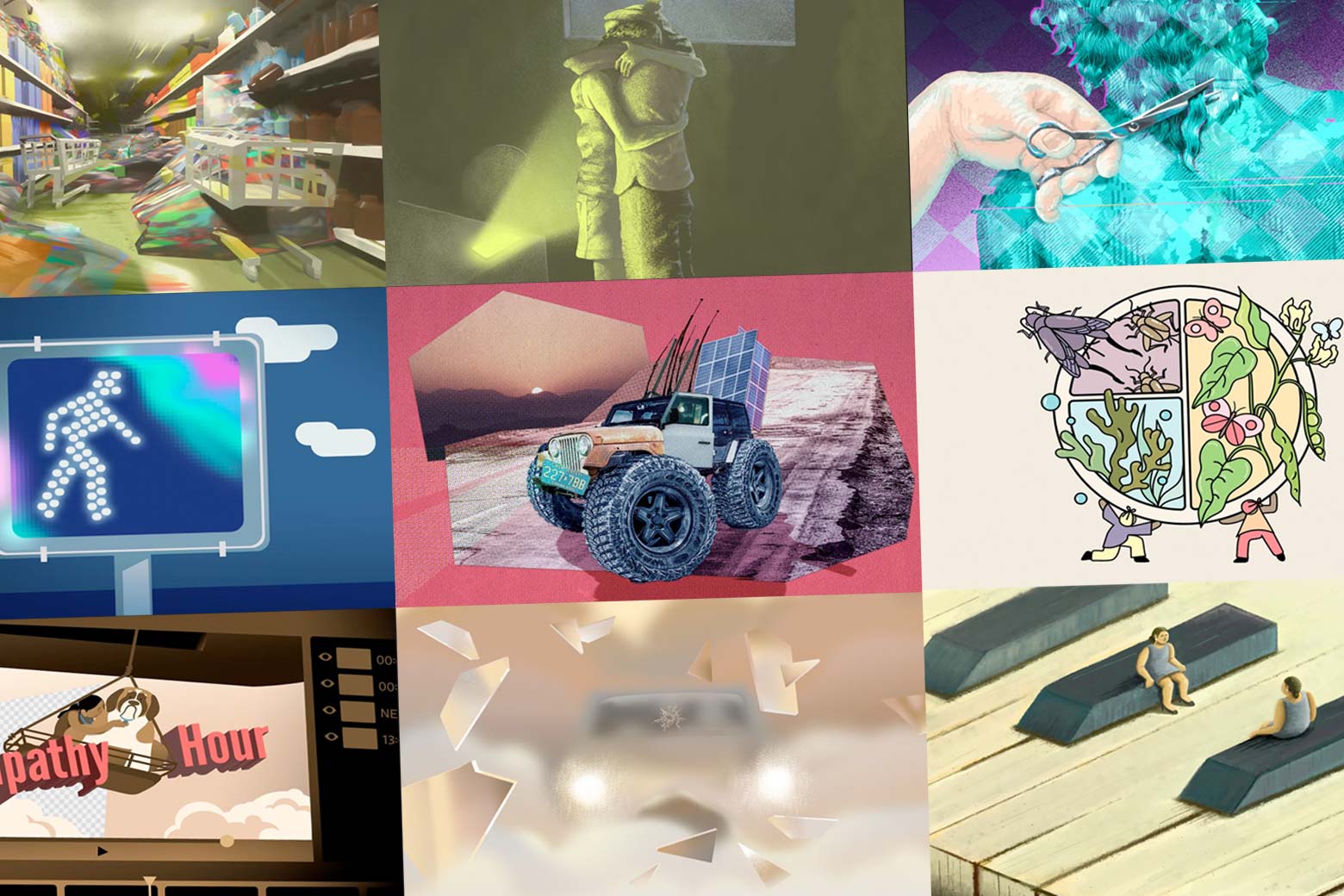
12 Sci-Fi Stories to Help Make Sense of the Climate, Risk, and Our Digital Lives
Reading Time: 4 minutesFuture Tense Fiction: Must-read science-fiction stories from 2022.
Five years ago, Future Tense Fiction started publishing a short science-fiction story each month. Our goal was simple: to give people more tools to imagine our future through tales that inspire us to weigh reasons for concern against excitement, caution against exploration. More than 60 stories later—plus accompanying response essays and art—we’ve covered mobility and A.I. ethics, space exploration and biometric surveillance, gig work and military tech, gender and the relationships between humans and animals … and much more. The stories serve as both alarm clocks and lighthouses, waking us up to challenges stemming from scientific and technological change and guiding us toward possible ways forward. They are written by authors and journalists, but also by researchers, doctors, and policymakers, from the U.S. and elsewhere (Hong Kong, Norway, Mexico, Sri Lanka, and Nigeria, to name a few). In 2019, we published a book, and in 2023, we’re excited to present our stories in a new format—stay tuned!
This year, many of our stories wrestled with the tension between environmental anxiety and hope. Premee Mohamed’s ‘All That Burns Unseen‘ is a story about the future of wildfires and the fickle reasons some people are evacuated while others are left behind. Matt Bell’s ‘Empathy Hour‘ explores what it means to be empathetic in the midst of climate disaster. Palmer Holton’s ‘Universal Waste‘ is a murder mystery set in a landfill that asks what future we really want for our trash. Brenda Cooper’s ‘Out of Ash‘ tells the story of a governor who built a new, more climate-resilient state capital—but didn’t think through whether people would actually want to move there. Margrét Helgadóttir’s ‘A Lion Roars in Longyearbyen‘ asks whether the last animal of its kind belongs in the zoo or the wild. And JoeAnn Hart’s ‘Good Job, Robin‘ looks at the fragility of our food systems.
Bridging climate fiction with a focus on the politics of health and disability, A.T.
Greenblatt’s ‘If We Make It Through This Alive‘ tells the story of a cutthroat road race across a future U.S. where climate chaos has left infrastructure crumbling—and considers how we should, and often fail to, design our communities with a focus on accessibility.
Other stories from this year explored themes of risk, repetition, and loneliness that, three years into a pandemic, many of us are still grappling with. David Iserson’s ‘This, but Again‘ imagines the world as a computer simulation, in which the main character has to live his life over again, aware of what will happen but unable to change much. Then there’s B. Pladek’s ‘Yellow,’ which follows a couple with very different approaches to risk—and a tool that assigns a risk score to their every activity. And Ysabelle Cheung’s ‘Galatea‘ imagines a robot programmed for companionship who is quietly connected to a world her owner knows nothing about.
Meanwhile, Julian K. Jarboe’s ‘The Only Innocent Man‘ and Cat Rambo’s ‘The Woman Who Wanted to Be Trees‘ explore the digital traces, artifacts, and archives we leave behind. In both stories, our digitized selves exist alongside our physical realities, but they also have the power to cross the barrier, haunting us from our pasts or projecting distorted versions of our identities into the future.
The stories’ response essays delve into these imagined worlds, picking apart their lessons for what we could do better in our own world, today. In response to ‘All That Burns Unseen,’ Meg Duff points out the similarities between the dangerous firefighting chemicals used in Premee Mohamed’s story and those we use in the real world, and charts the path toward safer options. Similarly, in their response to Matt Bell’s ‘Empathy Hour,’ Yuliya Panfil and Tim Robustelli outline how we need to prepare if we hope to equitably receive the 200 million climate refugees expected by 2050.
We hope you’ll keep reading with us. Be sure to sign up for the Future Tense newsletter to never miss a story—our next one will be published at the end of January. In the meantime, catch up on everything we published in 2022 below.
‘If We Make It Through This Alive,’ by A.T. Greenblatt
‘How Heeding Disabled People Can Help Everyone Survive Crises,’ by Damien P. Williams
‘Good Job, Robin,’ by JoeAnn Hart
‘Should Crickets Be on the Menu Now, or Just in the End Times?‘ by Christy Spackman
‘Empathy Hour,’ by Matt Bell
‘What Are We Going to Do With More Than 200 Million Climate Refugees?‘ by Tim Robustelli and Yuliya Panfil
‘The Woman Who Wanted to Be Trees,’ by Cat Rambo
‘Is a Lasting Digital Memorial to a Dead Person Even Possible?‘ by Tamara Kneese
‘Out of Ash,’ by Brenda Cooper
‘You Can Build It. But Will They Come?‘ by Molly Brind’Amour
‘This, but Again,’ by David Iserson
‘If We’re Living in a Simulation, the Gods Might Be Crazy,’ by Eric Schwitzgebel
‘All That Burns Unseen,’ by Premee Mohamed
‘Firefighting Chemicals Are Dangerous for the Environment. Can That Change?‘ by Meg Duff
‘The Only Innocent Man,’ by Julian K. Jarboe
‘The Plight of the Former Fanfiction Author,’ by Casey Fiesler
‘Yellow,’ by B. Pladek
‘Can Your Health Be Boiled Down to a Single Number?‘ by Lorens Helmchen
‘Galatea,’ by Ysabelle Cheung
‘The Cultural Baggage Behind Feminized A.I.,’ by Dorothy R. Santos
‘Universal Waste,’ by Palmer Holton
‘The Laws of Thermodynamics Will Not Bend for Landfills,’ by Josh Lepawsky
‘A Lion Roars in Longyearbyen,’ by Margrét Helgadóttir
‘The Dawn of the Synthetic Age,’ by Christopher Preston
Ref: slate
MediaDownloader.net -> Free Online Video Downloader, Download Any Video From YouTube, VK, Vimeo, Twitter, Twitch, Tumblr, Tiktok, Telegram, TED, Streamable, Soundcloud, Snapchat, Share, Rumble, Reddit, PuhuTV, Pinterest, Periscope, Ok.ru, MxTakatak, Mixcloud, Mashable, LinkedIn, Likee, Kwai, Izlesene, Instagram, Imgur, IMDB, Ifunny, Gaana, Flickr, Febspot, Facebook, ESPN, Douyin, Dailymotion, Buzzfeed, BluTV, Blogger, Bitchute, Bilibili, Bandcamp, Akıllı, 9GAG